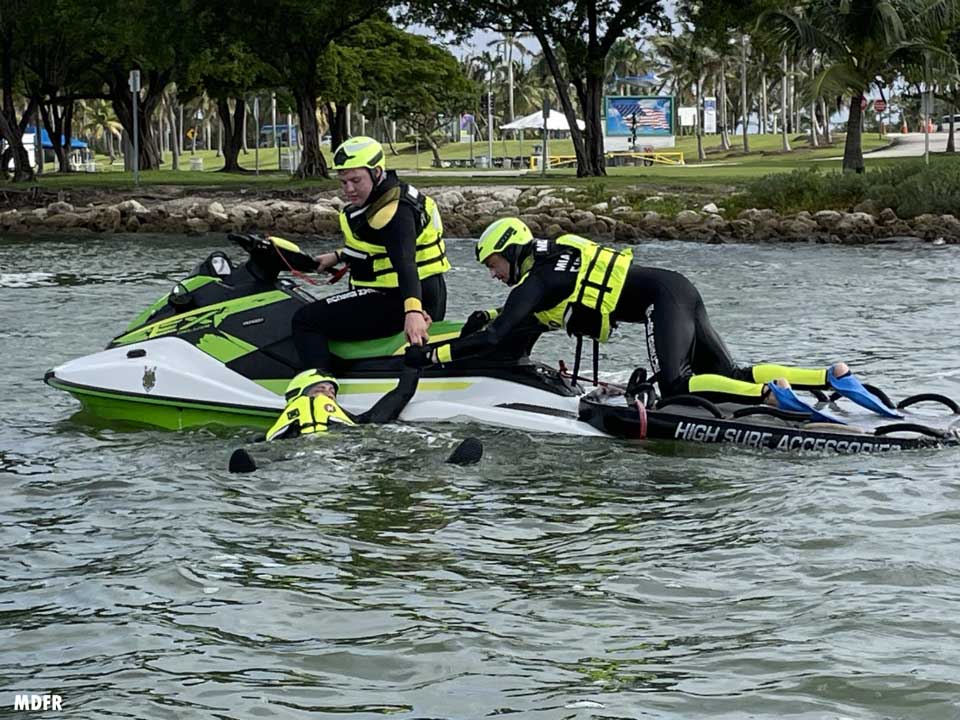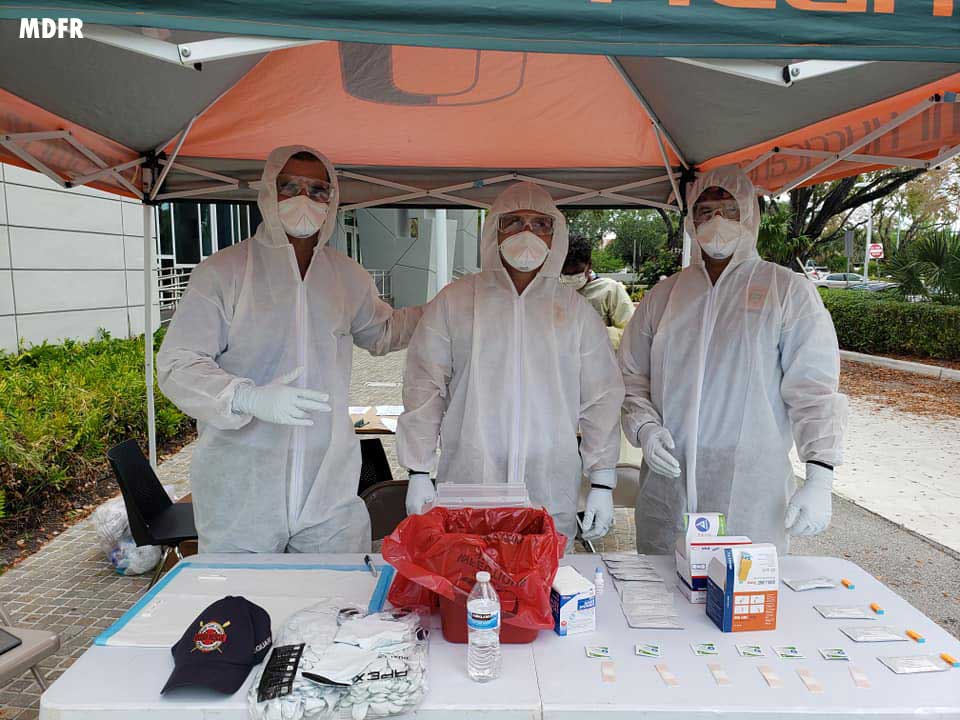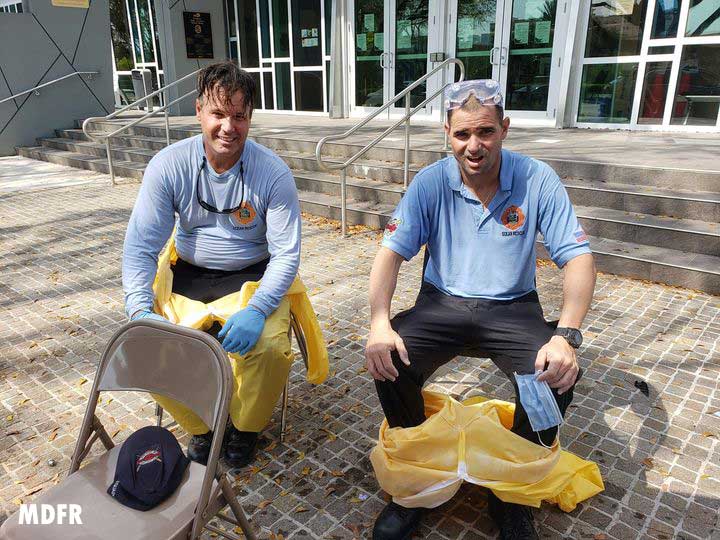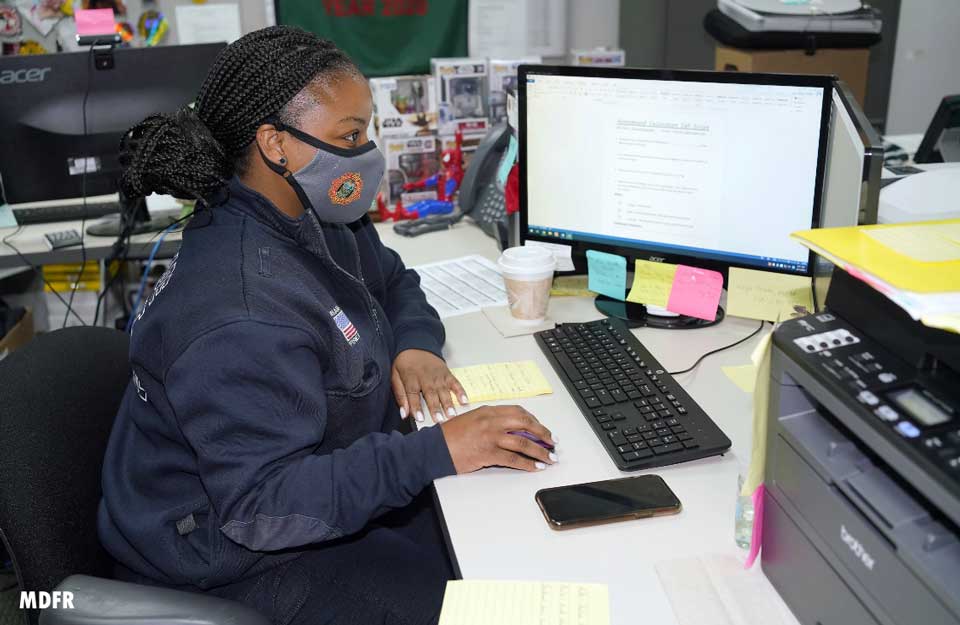
By Matthew Sparling
Miami-Dade (FL) Fire/Ocean Rescue lifeguards are some of the busiest in the country. Ocean Rescue has 76 year-round personnel who are employed by Miami-Dade Fire Rescue (MDFR) and are attached to MDFR’s Marine Service Bureau. The majority of Ocean Rescue lifeguards are certified as paramedics or EMTs which is crucial for immediate resuscitation of drowning victims as soon as they are pulled from the water. Every year, Ocean Rescue Lifeguards save dozens of people from drowning. When swimmers are caught in rip currents, it is not unusual for lifeguards to save multiple people in one event.
In March 2020, lifeguards made a different kind of save when they “rescued” three MDFR Fire Recruit classes. As the virus spread like wildfire through Miami-Dade County, MDFR was running three concurrent recruit classes totaling more than 70 recruits. The initial incident action plan (IAP) was to discontinue all three classes and task the recruits with COVID-19 testing and immunization. The plan changed. At one point as many as 160 MDFR personnel tested positive for the virus and many became critically ill and had to be hospitalized. With so many personnel out sick, training recruits and getting them out in operations companies became a top priority.
On March 21, 2020, all beaches within Miami-Dade County were closed to help slow the spread of the coronavirus. Closing the beaches would have left lifeguards unemployed but MDFR Marine Services Bureau Chief Andy Alvarez developed a plan to deploy lifeguards as they would in a hurricane. For hurricanes, lifeguards staff evacuation shelters and perform a wide range of logistical duties. In accordance with Miami-Dade’s COVID incident command system (ICS), lifeguards were assigned to the Operations Section Testing Branch for testing, vaccinations, and logistics. This made it possible to continue the recruit’s training and get them into operations where they were desperately needed.

System Developed From the Ground Up
Miami-Dade County is no stranger to hurricanes and MDFR has plenty of experience executing a hurricane IAP. No agency, however, had any experience in how to respond to a modern pandemic. Fire captains Jason Fernandez and Robert Cardenas were designated by MDFR Chief Alan Cominsky to be branch directors for testing. These captains developed a system from the ground up that facilitated training of personnel, acquiring testing supplies and personal protective equipment, establishing a command and dispatch center, and tracking the status and location of field-testing units. Rapid antibody serological test kits were purchased that mixed a drop of blood with a solution in a cartridge and provide a test result in 10-15 minutes. After Ocean Rescue staff were trained by the branch directors, they operated drive-up test sites at MDFR headquarters and later deployed to fire stations to test MDFR personnel.
RELATED TRAINING
Lessons Learned: SARS-CoV-2 and the Fire/EMS Profession
Should We Be Thinking of a Long-Term COVID-19 Medical Surveillance Program for First Responders?
Fire Department Response to Healthcare Facilities During the COVID-19 Pandemic
Partnership with UM
The University of Miami (UM), in partnership with other departments, had agreed to start testing the general public, but they could not take on this endeavor without help. The goal was to test for 10 weeks, performing 750 tests a day at library sites throughout Miami-Dade County. Ocean Rescue lifeguards again stepped up to perform serological tests. Lifeguards worked 12-hour days in the South Florida tropical heat wearing full PPE.
This is where physical conditioning really paid off. Ocean Rescue lifeguards must maintain an extremely high level of physical fitness. Every year they must pass a grueling test of running and swimming. Discipline is also a contributing factor. Ocean Rescue is a paramilitary agency with a rank structure similar to fire departments.

Testing and Comforting the Home-Bound
Although drive-up testing was a success, what of those who could not drive to test sites? The community of home-bound seniors and individuals with disabilities, who could not get to testing sites and who were in a higher risk category for complications from COVID-19, were not getting tested. Lifeguards became the “can do” core group of the In-Home Mobile Testing Initiative. A call center was set up for the elderly and physically impaired to request testing. Ocean Rescue Lifeguards were trained to perform swab tests in the mouth and, subsequently, nasal swab tests (PCR). Organized into teams of two, each team of lifeguards would drive to individual’s homes to perform tests and to advise and comfort frightened elderly patients. Beginning in January 2020, lifeguards who are certified paramedics began to assist MDFR firefighter/paramedics with vaccinating people at their homes who are unable to get to a vaccination site.
As the numbers of COVID cases trended downward in June, Miami-Dade beaches reopened, placing half of Ocean Rescue staff back lifeguard duty. Others remained assigned to COVID-19 testing. Some worked both the beach and COVID testing initiatives. The beach became very busy for lifeguards as people were eager to resume outdoor activities. As a result, Miami-Dade beaches saw a significant increase of water rescues, boating accidents, and medical calls.

Testing Inmates
Shortly after the beaches were reopened, a request was received from one of the largest correctional facilities in Miami-Dade County with a need to test inmates until a contractor could take over. Ocean Rescue Lifeguards volunteered to go behind bars, with some lifeguards working a shift at the beach and then working an additional four to five hours at night in the jail.
When the coronavirus began to spread through the Miami area, there were many unknowns about its short and long-term risks. Miami-Dade Ocean Rescue lifeguards accepted the risk, however uncertain, volunteered to perform COVID-related duties, and gave it their all.
At this year’s annual medal day award ceremony, the entire Ocean Rescue COVID Response Team was awarded MDFR’s Major Campaign Citation in recognition of their outstanding performance during very difficult times.
Matthew Sparling is a captain with the Miami-Dade County Fire/Ocean Rescue Bureau.

